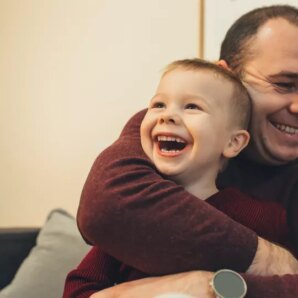What is a fostering panel?
Every fostering applicant goes through five stages before becoming an approved foster parent: initial enquiry, home visit, application, Form F assessment and, finally, the fostering panel.
Many children in care have experienced abuse, neglect, or other challenges in their early years. Fostering panels are designed to ensure prospective foster parents can provide these children with the safety, stability, and love they need to heal, thrive and achieve their goals.
Before and during your fostering panel meeting, members of the panel will carefully review your Form F assessment. They may ask you some questions or request additional information to help them make a recommendation to the Agency Decision Maker about your suitability to foster.
Attending your fostering panel meeting may sound daunting, but many of our foster parents describe it as more of a friendly chat than a formal interview. You’ll also only attend once your assessing social worker thinks you’re ready, so fostering panel rejections are rare.

Who sits on a fostering panel?
In England, five to seven people with fostering experience sit on the fostering panel. In Scotland, they operate with a minimum of three panel members, although they often have more.
Both include one or more independent members who aren’t connected to the fostering agency. Independent members make sure recommendations are unbiased and take different perspectives into account, which is an essential part of safer recruitment.
Here are some people you might see at your fostering panel meeting:
- The Chair: They’ll be independent of Fosterplus and will lead the meeting.
- The Vice-Chair: If the Chair is unavailable for any reason, the Vice-Chair will lead the meeting instead.
- Independent members: They might be care leavers, experienced foster parents, fostering specialists with expertise in health or education, or other relevant professionals.
- Social workers: They’ll have at least three years of experience in fostering.
- Non-panel members: This includes an advisor to the panel, an administrator taking minutes, and your assessing social worker.
This may seem like a lot of people, but each person will bring a unique perspective. No one is there to catch you out or make life difficult for you – they’ll be warm, welcoming, and supportive. These days, fostering panel meetings often take place virtually via Teams, but if you feel like you might need a little extra support, you can still ask a friend or family member to join the meeting with you.
Questions asked at fostering panel
Fostering panel questions are all about getting to know you better and clarifying the details provided in your Form F assessment.
Panel members will review your Form F assessment before the meeting, preparing any questions they may have about the information you’ve shared. They’ll also want to know why you want to foster and check that you fully understand the roles, responsibilities, and challenges that come with fostering.
Panels will often ask a combination of standard questions and ones specific to you, your family, and your fostering assessment. For example, they may ask, ‘How did you find your pre-approval training and Form F assessment?’ or ‘How will you balance fostering with your other commitments?’ And because fostering is always about the children, they may ask you questions prepared by children in foster care to help you consider their perspectives.
They’ll also take your family into account. If you’re fostering with children of your own, they’ll want to make sure you’ve fully reflected on how fostering could impact them, and you’ll have an opportunity to ask questions too.
Remember – the panel aren’t there to catch you out. They just want to get to know you better and understand the details in your Form F assessment so they can make the right recommendation.
“When I attended panel, I was thinking, oh my goodness, what’s it going to be like? But it was just like having a normal conversation. My assessor was helping me through the process. They were making sure I was right for what I was applying for. It wasn’t just for any other agenda – just that I had all the checks in place and I was doing it for the right reason.” Stavrina, foster parent.
What happens next?
Once the meeting is over, the panel will discuss your Form F assessment and your answers to their questions before making a recommendation.
- Fostering panels will make one of the following recommendations:
- Positive recommendation: They agree that you should become an approved foster parent.
- Deferred recommendation: They need more information before they can make a recommendation.
- Negative recommendation: They don’t believe you should be approved to foster.
Rest assured, negative recommendations are very rare – you’ll only go to a fostering panel meeting when your assessing social worker thinks you’re ready.
Recommendation to approval
Although the fostering panel will make a recommendation about your approval to foster, they don’t make the final decision – that responsibility lies with the Agency Decision Maker (ADM).
Here’s what happens after a recommendation has been made:
- The Chair of the meeting will sign off the minutes.
- The recommendation and meeting minutes will then be passed to the Agency Decision Maker (ADM).
- The ADM will carefully review the minutes, evidence, and views of each panel member.
- The ADM has seven working days from receiving the minutes to make the final decision and approve you to foster.
Future fostering panel meetings
Once you’re an approved foster parent, you’ll attend a panel meeting each year as part of your annual carer review.
These meetings give you an opportunity to reflect on the past year and help the panel understand how you’ve been getting on.
Your supervising social worker will prepare and share a report with the panel, who will then make a recommendation about your continued approval to foster. They’ll consider details such as changes in your circumstances, how the children in your care have progressed, and training you’ve completed.
They’ll also discuss your goals for the next year and identify whether there is any additional support that could help you along the way.
We’re here to support you
At Fosterplus, we’re here to support you, no matter where you are on your fostering journey. So, if you’d like to learn more about becoming a foster parent, including the Form F assessment, fostering panel, and welcoming your first child, we’d love to hear from you. Call us on 0800 369 8512 or fill out our online enquiry form and we’ll be in touch.

You may also find interesting…
Speak to our team
Whether you’re ready to apply or just want to find out more, get in touch with us today
Enquiry
Please make sure you read our terms and conditions because you’re agreeing to them by submitting an enquiry. It’s also worth reading our privacy policy and cookies policy so you understand how we collect and use your personal data. This site is protected by reCAPTCHA and the Google Privacy Policy and Terms of Service apply.
Can’t find what you’re looking for?
By Phone
One of our team is available to talk to you over the phone to answer any of your fostering queries.
By Email
You can get in touch by filling out our online enquiry form with any queries that you may have.
Visit an office
Find contact details for your local office team. We’re always happy for you to pop-in and chat.





